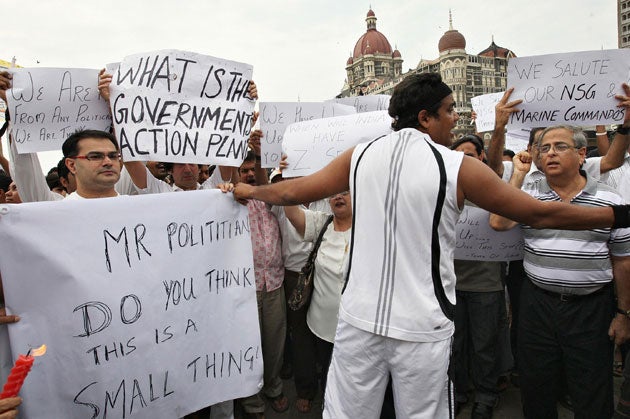Your support helps us to tell the story
This election is still a dead heat, according to most polls. In a fight with such wafer-thin margins, we need reporters on the ground talking to the people Trump and Harris are courting. Your support allows us to keep sending journalists to the story.
The Independent is trusted by 27 million Americans from across the entire political spectrum every month. Unlike many other quality news outlets, we choose not to lock you out of our reporting and analysis with paywalls. But quality journalism must still be paid for.
Help us keep bring these critical stories to light. Your support makes all the difference.
India's top security official offered his resignation today as the government struggled under growing accusations of security failures following the Mumbai attacks that left at least 174 people dead.
Home Minister Shivraj Patil submitted his resignation letter to Prime Minister Manmohan Singh but has not received a response, said aide R.K. Kumar.
Patil has become highly unpopular during a long series of terror attacks and his departure has long been predicted in political circles.
"Our Politicians Fiddle as Innocents Die," read a headline today in the Times of India newspaper, part of a growing chorus of criticism.
A day after the siege ended, corpses were still being brought out of the Taj Mahal hotel where three suspected Muslim militants made a last stand before Indian commandos killed them in a blaze of gunfire and explosions.
The rampage was carried out by gunmen at 10 sites across Mumbai starting on Wednesday night.
The death toll was revised down today from 195 after authorities said some bodies were counted twice, but they said it could rise again as areas of the Taj Mahal were still being searched. Among the dead were 18 foreigners, including six Americans. Nine attackers were killed.
The dead also included Germans, Canadians, Israelis and nationals from Britain, Italy, Japan, China, Thailand, Australia and Singapore.
A previously unknown Muslim group called Deccan Mujahideen - a name suggesting origins inside India - has claimed responsibility for the attacks. But Indian officials said the sole surviving gunman, now in custody, was from Pakistan and voiced suspicions of their neighbour.
Pakistan denied it was involved and demanded evidence.
The assaults have raised fears among US officials about a possible surge in violence between Pakistan and India. The nuclear-armed rivals have fought three wars against each other, two over the disputed region of Kashmir.
Prime Minister Singh called a rare meeting of leaders from the country's main political parties to discuss the situation today.
Each new detail about the attackers raised more questions. Who trained the militants, who were so well prepared that they carried bags of almonds to keep their energy up? What role, if any, did Pakistan play in the attack? And how did so few assailants, who looked like college students, wreak so much damage?
The gunmen were as brazen as they were well trained, using sophisticated weapons as well as GPS technology and mobile and satellite phones to communicate, officials said. The group made repeated contact with an unidentified foreign country.
"Whenever they were under a little bit of pressure they would hurl a grenade. They freely used grenades," said J.K. Duet, director general of India's elite commando unit.
Suspicions in Indian media quickly settled on the militant group Lashkar-e-Taiba, long seen as a creation of the Pakistani intelligence service to help wage its clandestine war against India in disputed Kashmir.
A US counterterrorism official said some "signatures of the attack" were consistent with Lascar and Jaish-e-Mohammed, another group that has operated in Kashmir. Both are reported to be linked to al Qaida.
President George W Bush pledged full US support for the investigation, saying the killers "will not have the final word". FBI agents were sent to India to help with the probe.
The Indian navy said it was investigating whether a trawler found drifting off the coast of Mumbai, with a bound corpse on board, was used in the attack.
It was the country's deadliest terrorist act since the 1993 serial bombings in Mumbai which killed 257 people.
Subscribe to Independent Premium to bookmark this article
Want to bookmark your favourite articles and stories to read or reference later? Start your Independent Premium subscription today.

Join our commenting forum
Join thought-provoking conversations, follow other Independent readers and see their replies
Comments